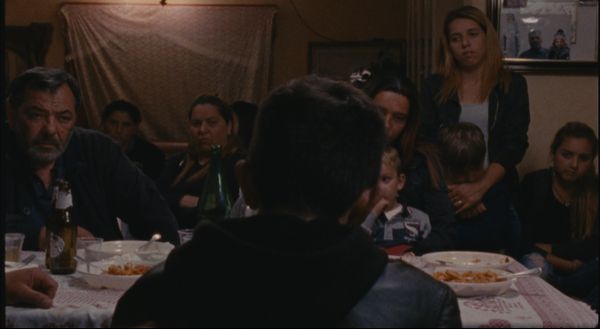Eye For Film >> Movies >> The Ciambra (2017) Film Review
The Ciambra
Reviewed by: Amber Wilkinson

Fact meets fiction in Jonas Carpignano's latest film, set among a Romani community in Calabria, where his cast of non-professional actors skate close to their own lives with his charged neo-realism story of tough adolescence. Pio (Pio Amato) is a young teenager who is rushing headlong as fast as he can into adulthood.
"It's us against the world," his grandfather tells him but that seems like a pretty even contest to someone like Pio, who is like one of those little dogs who thinks nothing of taking on a Rottweiler because he has no real sense of his actual size. Cute on the inside and trouble on the outside, he's more likely to duck and dive than walk in a straight line. He idolises his brother Cosimo (Damiano Amato), the already hardened off version of what Pio hopes to become.

He gets his chance sooner than he imagines when older members of his family fall foul of the law but, as life as well as film has taught us, lack of experience can be a curse as well as a blessing. Carpignano is interested in the margins - and the fringes of those margins. This is not just a picture of the Romani community but of the various African migrants who share the port town with them, brought into focus by Ayiva (Koudous Seihon), trying to forge a new life in Italy after leaving Burkina Faso and who has more apparent concern for Pio than anyone else. Importantly, however, what Carpignano is driving at here is not poverty porn. Pio is faced with genuine choices as a result of his own actions rather than simply having problems thrust upon him.
Cinematographer Tim Curtin keeps his camera on the move, we flow alongside him as he hurtles along with Pio or throws us into the chaos of a family dinner, drinking in the natural energy that is to hand. Carpignano also does a good job of reminding us of the child inside the wannabe gangsta - the youngster's fear of trains or the look of uncertainty when he is faced with potential sexual adulthood - although given that this is Amato's genuine environment, you could argue he is mostly simply documenting what is being felt for real.
This last element means you can't quite escape the ethics of the situation as you watch, particularly when prostitutes are involved - to what extent is a director of a fictional film, at least on paper, morally compromised by shooting his under-age subject in dubious scenarios? What happens to the 'actors' when the cameras move on? The film has plenty of memorable moments but worry about the long-term outcome for Pio the person, rather than Pio the character, also lingers on.
Reviewed on: 15 Feb 2018
















